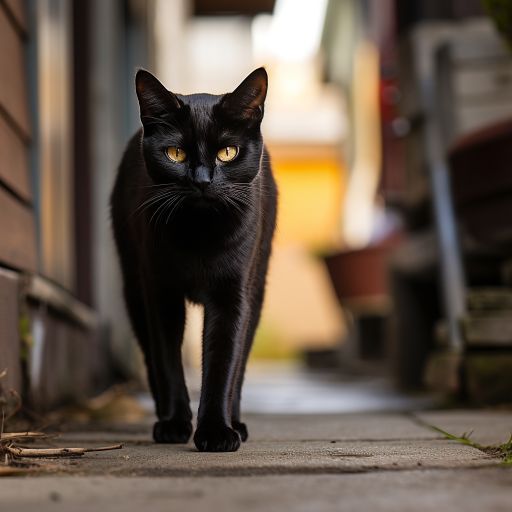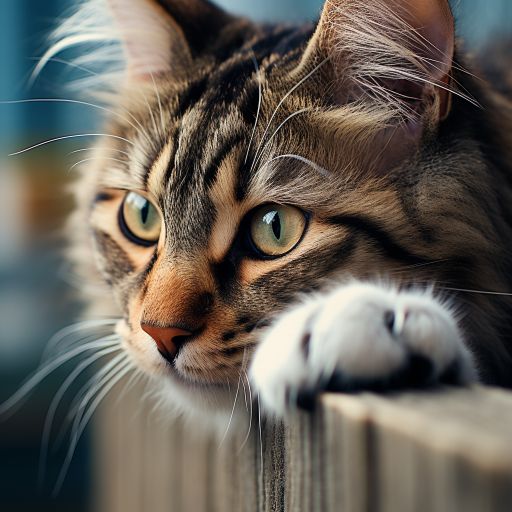Cats Mourn Their Loved Ones
If you suspect that your cat is grieving, there are some compassionate ways you can help them cope with their loss. First, ensure that the environment remains calm and stable, as changes can exacerbate their stress. Spend extra time together, offering gentle affection and companionship, which can provide comfort during this challenging time. Engage them in their favorite activities, such as playtime or cuddling sessions, to help distract and uplift their spirits.
Additionally, consider offering new toys or treats to entice them, though be patient if they seem disinterested at first.
It’s also essential to maintain a consistent feeding schedule, ensuring their nutritional needs are met, as grief can sometimes affect a cat’s appetite. Monitor their behavior for any signs of distress, and if necessary, consult your veterinarian for further guidance. With your love and support, your grieving cat can find comfort and healing in their own time.

Table of Contents
1. Changes in Behavior
One of the most significant indicators that a cat is mourning is a change in behavior. After the loss of a loved one, whether it’s their human or another pet, cats can display greater withdrawal and solitude. Cats Mourn Their Loved Ones. They may isolate themselves in closets, behind furniture, or even beneath beds. This behavior can echo a grieving process akin to how humans might feel the urge to retreat into themselves when faced with loss.
Moreover, mourning cats may display a range of unusual behavior. Increased vocalization, such as meowing or howling, can sometimes signify distress related to their loss. Cats Mourn Their Loved Ones. A previously sociable cat may suddenly exhibit clinginess, seeking out affection and attention from their remaining human companions. This shift serves as a heart-wrenching reminder that their emotional landscape has changed drastically.
2. Altered Eating Habits
When navigating grief, many individuals experience alterations in their appetite and eating patterns. Likewise, cats can exhibit similar changes, showcasing their emotional response to the loss of a loved one. Cats Mourn Their Loved Ones. A mourning cat may lose interest in food altogether or, conversely, may indulge excessively as they search for comfort in their meal times.
Moreover, behavioral changes related to food can often signify deeper emotional distress. If a feline friend suddenly refuses their favorite treats or seems uninterested in mealtime activities, it can indicate their minds are preoccupied with their grief. Cats Mourn Their Loved Ones. Pet owners should remain vigilant, as providing comfort through food can sometimes offer subtle healing during this difficult period.
3. Scent Memory and Attachment
Cats are creatures of habit, and much of their emotional attachment revolves around scent. Cats Mourn Their Loved Ones. After the death of a loved one, a cat may exhibit behaviors indicative of seeking out the scent of that loved one. They might sniff clothing or personal belongings, lingering in the familiar aroma that provides comfort.
In this context, scent becomes a powerful memory trigger. A lingering smell can evoke memories tied to their bond, allowing the cat to momentarily feel close to their departed companion. Cats Mourn Their Loved Ones. By understanding these behaviors, we can appreciate their emotional capacity for grief, highlighting that cats do experience profound connections with those they love.
4. Changes in Grooming Habits
Grooming is an essential method by which cats maintain their cleanliness and emotional well-being. However, when faced with loss, a cat’s grooming habits may change significantly. Cats Mourn Their Loved Ones. Some cats may excessively groom themselves, perhaps as an outlet for their anxiety, while others may neglect their grooming entirely, resulting in a disheveled coat.
Grooming—or the lack thereof—often mirrors an emotional state. A cat that is grieving may look unkempt or scruffy due to their inability to manage typical grooming behaviors. This change can serve as an opportunity for pet owners to step in with extra love and care, helping to soothe their feline companions during a challenging time.
5. Changes in Sleeping Patterns
Another observable sign that cats mourn their loved ones revolves around altered sleeping patterns. Cats are notorious for their desire to nap frequently; however, after losing a companion, they may either become more restless or sleep excessively. They may seek out specific sleeping spots that were once shared with the departed loved one.
This shift in sleep habits can indicate that the cat is experiencing emotional turmoil. Cats Mourn Their Loved Ones. A restless cat may appear anxious, frequently waking or moving around the house in search of answers. Meanwhile, excessive sleep can signify a retreat from their reality, whereby they attempt to escape the painful reminder of their loss. Understanding these changes can help owners provide the right support and comfort.
6. Searching Behaviors
When faced with the loss of a loved one, cats can display searching behaviors that signal their quest for understanding. You may notice your cat pacing or peering around corners, as if expecting to find their deceased friend waiting to reappear. Cats Mourn Their Loved Ones. This exploratory behavior mirrors human tendencies to seek closure or resolution.
Furthermore, a mourning cat may frequently return to areas that were once frequented by their lost companion. This searching behavior allows them to process their emotions, and pet owners can offer comfort during these times. Cats Mourn Their Loved Ones. By gently reassuring the cat, owners may help ease their feelings of confusion and anxiety.
7. Emotional Expressions through Purring
Cats communicate their feelings through a complex language of vocalizations and physical gestures. When mourning, some cats may express their emotions through purring, which can often signify both contentment and discomfort. Cats Mourn Their Loved Ones. A grieving cat’s purring might sound different, an indication of distress rather than a sign of positive emotions.
Pet owners should readily recognize the nuances of their cat’s vocalizations. A purring cat seeking attention may be trying to communicate its feelings of sorrow, looking for solace in human companionship. Offering gentle pets and reassurance during these moments can foster emotional healing for both the cat and its owner.
8. The Impact of New Loss
Interestingly, the emotional landscape of a cat can shift dramatically with the loss of a loved one. If a new pet is introduced shortly after the death of an existing companion, the grieving cat may react negatively. They might perceive the new addition as a replacement, amplifying their distress.
Cats thrive on routine and familiarity, and sudden changes can trigger responses associated with mourning. Cats Mourn Their Loved Ones. Therefore, it’s crucial for pet owners to approach introducing new pets with sensitivity and patience. Allowing the cat time to adjust and process their grief can promote a healthier emotional transition.
9. Social Withdrawal
While some cats may seek out affection and comfort during times of grief, others may respond by withdrawing from social interactions. This tendency to isolate serves as a protective mechanism, allowing the grieving cat to process its emotions in solitude. Cats Mourn Their Loved Ones. Owners may notice a decrease in playful behavior or a reluctance to engage in daily routines.
Prolonged social withdrawal can evolve into a concerning pattern, indicating that the cat may require the intervention of a veterinarian or animal behaviorist. Cats Mourn Their Loved Ones. Recognizing and responding to a cat’s need for space and time is crucial in supporting their emotional process.
10. The Healing Power of Time
Ultimately, just as in human grief, time plays a significant role in healing from the loss of a loved one. Cats may not showcase their mourning in the same way humans do, but they are undoubtedly capable of experiencing profound sadness. Cats Mourn Their Loved Ones. Over time, with love and support, cats can gradually return to their former selves, rediscovering joy and contentment.
During this healing journey, pet owners play an essential role in providing stability and comfort. Introducing new routines, engaging in interactive play, and ensuring consistent care serve as important elements in helping a grieving cat navigate its emotions.
The bond between cats and their loved ones is deep and complex. Observing the signs of grief can offer insight into their emotional experiences. Owners should embrace these moments, understanding that, indeed, cats mourn their loved ones in their unique ways.
Do Cats Mourn
Grief is a complex emotional response to loss, and while it’s predominantly recognized in humans, animals, including cats, also experience grief in their own way. The concept of whether cats mourn is a subject of ongoing debate among veterinarians and animal behaviorists. However, based on observations and studies, there is evidence that cats do indeed experience some form of grief.
When a feline companion loses a beloved owner or another pet, they may exhibit changes in behavior that suggest mourning. Cats Mourn Their Loved Ones. These behaviors can include lethargy, loss of appetite, excessive vocalization, or seeking solitude. Cats might also look for their deceased companions or behave in a way that shows they are missing them.
While the extent and manner of grieving can vary widely among individual cats, it is clear that they possess emotional depth. Cats Mourn Their Loved Ones. Acknowledging their capacity for grief can enhance our understanding and compassion for these beloved pets during difficult times.
Signs of Grief in Cats
Cats may not express their emotions as overtly as humans, but they do exhibit signs of grief when they experience the loss of a companion, whether it’s another pet or their owner. Cats Mourn Their Loved Ones. Recognizing these signs is crucial for understanding their emotional state and providing necessary support to a grieving cat. These signs can include changes in behavior, such as increased hiding or a withdrawal from interaction with people and other pets.
You might also notice alterations in eating habits, with some cats losing interest in food or drastically reducing their water intake. Cats Mourn Their Loved Ones. Vocalizations may change as well, with some cats becoming more vocal or exhibiting a mournful cry. Additionally, they may show signs of anxiety or restlessness, pacing around the home or searching for their lost companion. By being attentive to these signs, caregivers can offer comfort and help their feline friends navigate through their sadness with love and patience.
- Changes in Behavior: Cats may become withdrawn, lethargic, or lose interest in activities they once enjoyed, such as playing or exploring.
- Increased Vocalization: Cats may vocalize more frequently and their meows may sound more plaintive or mournful than usual.
- Searching Behavior: Cats may wander around the house or the area where the lost companion was last seen, as if looking for them.
- Loss of Appetite: Cats may eat less or even stop eating altogether, which can lead to weight loss and other health issues if not addressed.
- Changes in Sleep Patterns: Some cats may sleep more than usual, while others may have difficulty sleeping.
- Affectionate or Aggressive Behavior: Cats may seek more attention and comfort from their owners or display unexpected aggression towards other pets or even people.
How to Help a Grieving Cat
If you suspect that your cat is grieving, there are some compassionate ways you can help them cope with their loss. Cats Mourn Their Loved Ones. First, ensure that the environment remains calm and stable, as changes can exacerbate their stress. Spend extra time together, offering gentle affection and companionship, which can provide comfort during this challenging time. Engage them in their favorite activities, such as playtime or cuddling sessions, to help distract and uplift their spirits.
Additionally, consider offering new toys or treats to entice them, though be patient if they seem disinterested at first. It’s also essential to maintain a consistent feeding schedule, ensuring their nutritional needs are met, as grief can sometimes affect a cat’s appetite. Cats Mourn Their Loved Ones. Monitor their behavior for any signs of distress, and if necessary, consult your veterinarian for further guidance. With your love and support, your grieving cat can find comfort and healing in their own time.
- Provide a Safe Space: Create a quiet, comfortable space where your cat can retreat and feel secure. This could be a cozy bed in a secluded corner or their favorite spot.
- Maintain Routine: Cats thrive on routine, so try to stick to their regular feeding, play, and grooming schedule as much as possible. Predictability can provide a sense of stability during a turbulent time.
- Offer Comfort: Spend extra time with your cat, offering gentle petting, soothing words, and quiet companionship. Let them approach you for comfort on their terms.
- Familiar Scents and Objects: Keep familiar toys, blankets, or items that carry the scent of the lost companion around. These can provide comfort and reassurance.
- Consider Adopting Another Companion: While it’s important not to rush this decision, adopting another cat in the future could provide companionship and help alleviate loneliness once your cat has had time to grieve.

Understanding the Grieving Process in Cats
Grieving is a natural response to loss, and this is just as true for our feline companions as it is for humans. When a cat experiences the death of a close companion—be it another pet or even a human in the household—they may go through a grieving process that can manifest in various ways. Cats Mourn Their Loved Ones. Understanding this process is crucial for providing the best support to our grieving pets and ensuring their overall well-being.
Duration of Grieving
The duration of grief in cats can vary significantly depending on several factors, including the individual cat’s temperament, the nature of their bond with the deceased companion, and their overall emotional resilience. Cats Mourn Their Loved Ones. Some cats may seem to adapt to the change relatively quickly, resuming their normal behavior in a few days or weeks. Others may take much longer to process their loss, exhibiting signs of mourning for months. During this time, it is essential to be patient and attentive to their needs, providing them with extra care and understanding as they navigate their grief.
Physical Health Concerns
It’s important to recognize that prolonged grief can have repercussions on a cat’s physical health. Just as humans may experience stress-related illnesses during times of bereavement, cats can also suffer. Cats Mourn Their Loved Ones. Prolonged grief can lead to issues such as weight loss, lack of appetite, and a weakened immune system.
Behavioral changes like lethargy, increased hiding, or changes in grooming habits can also be indicative of distress. Cats Mourn Their Loved Ones. Regular veterinary check-ups become even more critical during such times. If a cat shows signs of prolonged grief, a veterinarian can provide guidance on how to support their emotional and physical well-being, which may include recommendations for dietary changes, stress-reducing strategies, or even medication in severe cases.
Creating a Supportive Environment
Providing a supportive environment is essential for a grieving cat. Cats are creatures of habit, and losing a companion can disrupt their routine and sense of security. Cats Mourn Their Loved Ones. Maintaining their daily structure can help ease their transition.
This includes sticking to feeding schedules, playtimes, and other routines that your cat is familiar with. It’s also beneficial to provide comforting spaces where they feel safe and secure, such as their favorite resting spots or cozy hiding places. Cats Mourn Their Loved Ones. Additionally, engaging them in gentle play and providing interactive toys can help redirect their focus and stimulate them mentally.
Importance of Mutual Support
If you, too, are grieving the loss of a pet, it’s important to recognize how your emotions can affect your cat. Animals are incredibly perceptive and often pick up on their owners’ emotional states, which can influence their own behavior and feelings.
Providing mutual support and understanding can enhance the healing process for both you and your cat. Cats Mourn Their Loved Ones. Speaking softly, spending quality time together, and practicing affectionate care can strengthen your bond and help both of you cope with the emotional aftermath of the loss.
Final Thoughts
In conclusion, understanding the grieving process in cats requires a compassionate approach. Acknowledging the varying duration of grief, monitoring physical health, creating a supportive environment, and emphasizing mutual care are all crucial steps in this difficult journey. Cats Mourn Their Loved Ones. By doing so, you can help your cat navigate their grief, maintaining their overall health and emotional well-being, while also allowing yourself to heal in the process. Grief is a journey of love, and with patience and understanding, both you and your feline companion can find solace in each other’s presence as you remember and honor those you have lost.

Conclusion
While the extent to which cats mourn is still debated, there is evidence that they experience grief and emotional distress when they lose a companion or owner. As pet owners, recognizing the signs of grief in cats and providing them with patience, understanding, and gentle support can make a significant difference in helping them cope with their loss. By creating a supportive environment and respecting their emotional needs, we can help our feline friends navigate through the grieving process with comfort and care.



